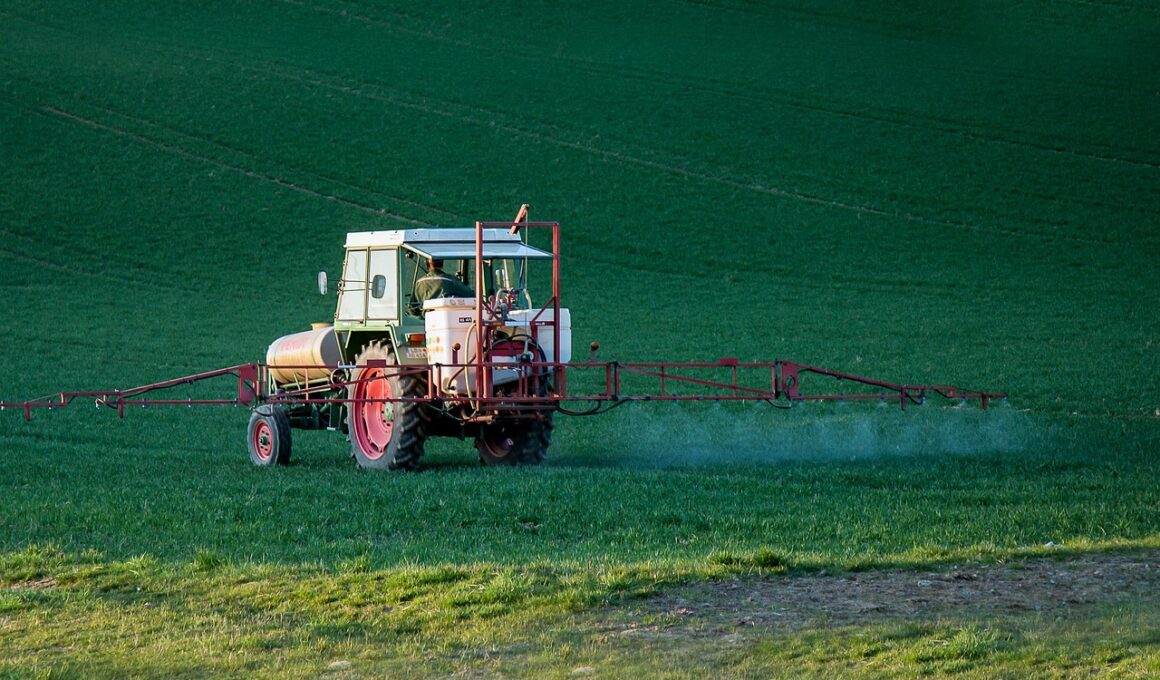Understanding Organic Food and Pesticides
Organic food has gained immense popularity as consumers seek healthier and sustainable options for their diets. Many buy into the belief that organic food is completely free from pesticides. However, this assertion warrants clarification. While it is true that organic farming allows the use of natural pesticides, it does not eliminate pesticide exposure entirely. The key difference lies in the types of pesticides used and how they are applied. Organic farmers primarily utilize substances derived from natural sources, which some believe to be less harmful than synthetic alternatives. Nonetheless, such pesticides can still pose risks. Understanding the nuances of organic farming entails recognizing that the term ‘organic’ does not equate to ‘pesticide-free.’ Various studies indicate that organic crops can indeed have residues, albeit different from those found in conventionally grown produce. Furthermore, awareness of the practices employed in organic farming can help consumers make informed choices. It is essential to consider the overall quality and safety of food sources, and an understanding of this complex issue will bolster discussions regarding organic food production and its effects on health.
Common Myths About Organic Food
In the realm of organic food, myths abound, particularly concerning pesticide use and safety. A prevalent myth is that organic foods contain no pesticides whatsoever, creating a false sense of security among consumers. However, organic farming employs a range of natural pesticides to protect crops from pests and diseases. This dispels the notion that organic produce is entirely free from such chemicals. Moreover, many believe that organic foods are inherently superior in safety and quality, thus neglecting the fact that even organic produce can sometimes harbor harmful bacteria. The level of risk associated with organic versus conventional foods can depend on various factors, including storage and handling. Consumers are often misled into thinking that organic foods eliminate pesticide exposure, overshadowing the importance of proper washing and cooking techniques. Another myth is that organic food offers significantly greater nutritional benefits, but current research largely shows inconclusive results. Ultimately, it is vital for consumers to critically assess these prevalent myths and make informed choices based on credible evidence, focusing on food safety practices rather than relying solely on perceptions surrounding organic products.
Pesticide Residues in Food
Studies have indicated that both organic and conventional foods can contain pesticide residues, albeit typically at varying levels. Organic pesticides used in organic farming are often less toxic than synthetic ones, but they are still present. Researchers have found that many consumers are unaware of the specific regulations governing organic farming practices, which allow certain natural substances that could still qualify as pesticides. Even natural pesticides can pose health risks if consumed in excess. Regulatory agencies continually monitor residue levels to ensure they remain within acceptable limits, taking measures to ensure consumer safety. In fact, the Environmental Protection Agency (EPA) assesses the risks and benefits associated with different pesticides, regulating those that can be used in organic farming. The Organic Foods Production Act mandates that organic farms focus on sustainability and biodiversity while controlling pests. However, this mission does not imply absolute absence of pesticides. Consumers should remain educated about their purchasing choices and understand the realities surrounding pesticide presence, regardless of whether food is labeled organic or conventional. An informed perspective can create healthier eating habits through appropriate consumption practices.
The Role of Washing and Cooking
Washing and cooking methods significantly affect pesticide residue levels on both organic and conventional produce. Many consumers underestimate the importance of cleaning fruits and vegetables before consumption, regardless of their origins. Proper washing can effectively remove pesticides, dirt, and bacteria, contributing to overall food safety. Studies suggest that using a vegetable brush helps in dislodging residues, especially on tougher-skinned fruits. Additionally, cooking can also reduce some pesticide residues, further minimizing exposure. Although organic foods may have lower levels of certain synthetic chemicals, they aren’t entirely free from pesticides. Thus, practices such as peeling and cooking can enhance safety measures. Moreover, employing techniques like boiling, steaming, or microwaving can often break down pesticide residues effectively, leading to healthier meals. Consumers must prioritize appropriate washing methods and proper food preparation techniques in their cooking routines. Ultimately, understanding how to handle and prepare food can significantly mitigate risks associated with pesticide exposure. Recognizing that food preparation plays a crucial role in health emphasizes the practical steps consumers can take to ensure they enjoy their meals safely and nutritiously.
Environmental Impact of Organic Farming
Advocates for organic farming often highlight its environmental benefits, promoting it as sustainable and eco-friendly. Organic farming practices generally focus on reducing harmful chemical use while fostering biodiversity, and sustainable soil health is a core principle. However, even organic farming has its challenges regarding pesticide application. While natural pesticides tend to be less damaging to the ecosystem compared to strong synthetic alternatives, their impact should not be overlooked. For example, some organic pesticides can still harm beneficial insects, leading to unintended ecological consequences. On the flip side, contemporary agricultural methods surrounding conventional farming have developed considerably, introducing integrated pest management systems designed to minimize pesticide usage effectively. The contrast emphasizes that neither farming method is without flaws, urging consumers to remain critical of the narratives surrounding organic versus conventional practices. Ultimately, consumers who aim to support sustainable farming should evaluate their choices based on a comprehensive understanding of both methods and their impacts on the environment. Awareness of the interplay between agricultural methods and ecological health is essential for promoting responsible consumer behavior regarding food choices.
Health Benefits of Organic Food
Choosing organic food often stems from a desire for better health, as consumers typically associate it with fewer chemicals and enhanced nutritional value. There is emerging evidence that organic foods can potentially offer a range of health benefits, such as higher levels of certain nutrients and antioxidants as compared to conventional products. While some studies corroborate these findings, others reveal inconclusive results. It’s essential for consumers to note that organic food hygiene and farming practices play a significant role in retaining nutritional quality. Importantly, organic food can be beneficial for consumers who are sensitive to conventional pesticide application. However, consumers should also consider balanced food choices, including a diverse range of fruits, vegetables, and whole grains. The risk of pesticide exposure perfectly demonstrates that no single food source or category can provide complete health protection. Achieving optimal health involves holistic engagement with diet choices, which necessitates shopping thoughtfully. Therefore, while organic foods can form part of a healthy diet, they should not serve as a panacea for dietary concerns. Engaging with a variety of foods in a balanced manner remains vital for health.
Making Informed Choices
Ultimately, making informed choices about food involves understanding the nuances surrounding organic products and pesticide exposure. Increasing awareness of agricultural practices, environmental impacts, and health consequences helps consumers navigate the complex world of food choices effectively. It’s essential to critically evaluate marketing claims infused with sensationalism and promise of health miracle benefits. By seeking credible information from reputable sources like agricultural extensions or research studies, consumers empower themselves. Additionally, this awareness cultivates a smarter approach in selecting organic or conventional foods, optimizing health while considering sustainability. Participating in local farmers’ markets or engaging directly with growers could also provide valuable insight into production practices. Striking a balanced diet encourages experimentation with various foods, rather than adhering strictly to the organic label. The presence of pesticides may not be a deciding factor in every individual’s purchasing decision, highlighting that personal values and preferences play a significant role. Ultimately, informed consumers can foster a healthier and more responsible food culture. A well-rounded perspective surrounding food production, safety, and nutrition can significantly enhance overall well-being.
Understanding Organic Food and Pesticides
Organic food has gained immense popularity as consumers seek healthier and sustainable options for their diets. Many buy into the belief that organic food is completely free from pesticides. However, this assertion warrants clarification. While it is true that organic farming allows the use of natural pesticides, it does not eliminate pesticide exposure entirely. The key difference lies in the types of pesticides used and how they are applied. Organic farmers primarily utilize substances derived from natural sources, which some believe to be less harmful than synthetic alternatives. Nonetheless, such pesticides can still pose risks. Understanding the nuances of organic farming entails recognizing that the term ‘organic’ does not equate to ‘pesticide-free.’ Various studies indicate that organic crops can indeed have residues, albeit different from those found in conventionally grown produce. Furthermore, awareness of the practices employed in organic farming can help consumers make informed choices. It is essential to consider the overall quality and safety of food sources, and an understanding of this complex issue will bolster discussions regarding organic food production and its effects on health.


